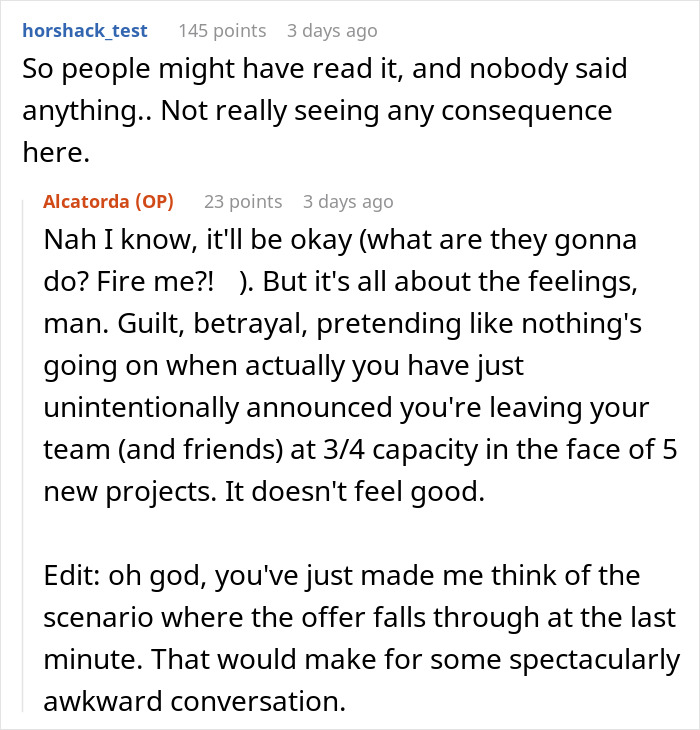Quitting a job can be cathartic, in the right circumstances, as we might envision a dramatic walk out, flipping off a horrible manager along the way. The reality is that most jobs don’t really warrant that kind of behavior, or, even worse, you might be in a workplace you actually like. It can then be pretty hard to actually tell your boss that you are leaving.
An internet user shared the time she accidentally opened her personal email, potentially revealing to everyone present, including her manager and CEO, that another company had confirmed her new job. Even worse, she hadn’t exactly told anyone she was changing jobs, leaving her in a supremely awkward position.
Sending in that two-week notice can be nerve-wracking, from the uncertainty of a new job to feeling like you betrayed the old one

Image credits: fauxels (not the actual photo)
An employee detailed the time she had accepted a new job offer but hadn’t told anyone yet







Without thinking, she shared her screen, where the new job email was clearly visible

Image credits: energepic.com (not the actual photo)



Image credits: Alcatorda
Contrary to popular depictions, most instances of quitting are calm and planned out
While Hollywood does love the dramatic quitting story, like Joanna in Office space, the vast majority of workers, being relatively rational, tend to have a quitting plan. Impulse quitting is considerably rare, even if many research respondents like to frame it like they simply stood up and left a job. People have an impulse to act like they are the masters of their destiny and can just get up and walk away from a bad job. The reality is that bills and responsibilities require a person to think it through before they quit, to at least have another job lined up. This fits with OP’s narrative, where they are waiting on a job contract to be finalized before giving a two-week notice.
The idea of quitting can also be stressful for other reasons. Even in a relatively good workplace, a person might not be sure how coworkers or a manager will react. If it’s a tight knit-group, this might feel like a betrayal, making it even harder to leave. This can create an unhealthy feedback loop where a person postpones making necessary changes and improvements for fear of ruining what they already have. There can also be a sort of uncertainty, as quitting feels final and in most cases, you still have to wait two weeks to start the new job. Like OP in the story, it’s easy to see how someone might procrastinate on sending a notice until they were absolutely sure.

Image credits: 20th Century Fox
Awkwardness aside, changing jobs does have its benefits
On the other hand, like ripping off a bandaid, there are a few benefits to finally quitting. Quitting most jobs is correlated with a reduction in depressive symptoms. Even in the case of impulse quitting, the person still had the desire to leave a job. This desire was strong enough to compel them to just get up and leave, perhaps giving a rousing speech before heading out the doors. Leaving a physically demanding job had the obvious and additional benefit of helping with physical health in the short term. Of course, the person still needs to maintain some physical activity, since our body doesn’t quite care where we are moving around, as long as we are moving.

Image credits: Andrea Piacquadio (not the actual photo)
OP answered some questions from commenters and everyone basked in the awkwardness of the situation


















 Follow Us
Follow Us





